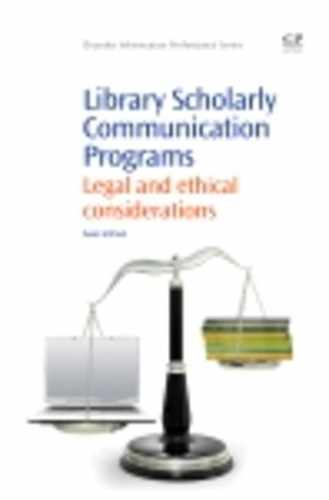Preface
My interest in the legal and ethical issues related to scholarly communication is somewhat accidental – a product of a relatively unique combination of professional experiences. Over the past six years, I have had the opportunity to help develop copyright guidelines for students and faculty, to revise our university’s intellectual property policy, to serve on our Institutional Review Board (IRB), to help found two scholarly journals, and to manage our institutional repository. All of these experiences have informed my work as a scholarly communication librarian in important ways, but the most significant in motivating me to write this book has been my time on the IRB. Even though the IRB focuses exclusively on oversight of human subject research, it has engrained two principles in me that I believe are applicable to all forms of research and scholarly communication. First, that researchers and scholars have ethical obligations both to those who contribute to their work (e.g., research subjects) and to those who read and rely on it. And, second, that if a scholar’s work does not meet those ethical obligations, it should never be distributed.
Traditionally, the responsibility for ensuring that unethical (or unsound) scholarship is not distributed has fallen to publishers; their imprimatur signals that the work they publish has met certain basic standards. As libraries assume the role of publishing and distributing scholarship, we must be able to offer a similar imprimatur. Whether we distribute work through an institutional repository, through an open-access journal, or through a digital monograph, we must be able to provide some assurance that the work differs from other open content on the Web. That difference will only exist if we develop standards for the work we distribute – for example, through policies and procedures that encourage legal and ethical work as well as through education for our communities. Of course, we can only develop – and apply – those standards if we understand the relevant legal and ethical issues.
This, ultimately, is why I believe this topic matters: libraries need to understand the responsibility and complexity that comes with our evolving role as not just collectors, but as distributors and publishers. It is only with this knowledge that we will be able to effectively advocate for meaningful change and help reshape the scholarly communication system. If we don’t understand the fundamental legal and ethical issues that the current system accounts for, our proposed changes will appear uninformed and irresponsible. The positive converse to this, of course, is that if we do understand these issues, we will be able to develop new systems and practices that not only improve access to knowledge, but that do so in a manner that is respected and valued.
Although I believe that my experience has given me a unique perspective from which to approach these issues, it would be irresponsible of me to imply that I am an expert on the topics presented here. It is my hope that this book will serve simply as a starting point for librarians, administrators, and others who wish to engage in a broader conversation about library scholarly communication programs – a conversation that moves beyond economics to include meaningful reflection on the legal and ethical dimensions of scholarship.
